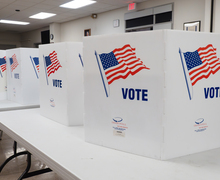Iraq War cost United States positive image
On Oct. 18, former Secretary of State Condoleezza Rice appeared on CNN International to discuss her legacy as secretary of state. ‘I do believe I would take Saddam Hussein out of power again, but of course in the rebuilding of Iraq … there are things I would do differently.’ Recently, Obama asked Rice to come to the White House for a discussion.
Rice went on to say, ‘Sometimes things that look terrific at the time look pretty bad in retrospect, and vice versa, so ultimately this is a story that will be written in history.’ However, it seems doubtful that we will think the war in Iraq was a positive engagement. Not only has it cost the United States money and lives, but it has cost the country its positive image.
Let’s start with the numbers: More than 4,000 U.S. troops have died. According to Iraq Body Count, an estimated 98,585 to 107,594 Iraqi civilians have died because of violence since the United States invaded in 2003. More than $739 billion has been spent. Have we anything to show for it?
We have no weapons of mass destruction. We have built schools, roads and hospitals for Iraq, but our infrastructure crumbled. We have eliminated Saddam Hussein, but it is not clear that we have gained anything. While many claimed he was a threat, what actual threat he posed is not apparent.
A more important consequence, apart from the raw numbers and physical outcomes, is how the United States has become delegitimized. When the United States invaded Iraq, it defied the United Nations. In 2008, when Russia invaded Georgia due to ‘security concerns,’ the United States hypocritically told Russia to listen to the U.N. and not invade Georgia. Over the past few years, the United States has told North Korea and Iran to follow the U.N.’s guidelines on their nuclear programs. But the United States has lost all authority to tell other countries to listen to the U.N. after they consciously violated its directives. We cannot have it both ways.
Our nation’s inconsistencies do not stop there. The torture at Abu Ghraib prison revealed the United State’s approach to torture, and the actions of a few soldiers helped to perpetuate a negative image of the U.S. torture that countered our country’s values of justice for all.
Holding ‘enemy combatants’ at Guantanamo Bay continues the pattern of our actions being contrary to our beliefs. Holding some individuals who we’ve labeled ‘enemy combatants’ without due process (and before the Supreme Court intervened, without access to a lawyer) but holding everyone else with due process deteriorates the United State’s image. Image matters if the nation expects cooperation and sympathy from the public in Iraq. ‘Winning hearts and minds’ cannot be done with duplicity.
There seems to be little reason to still defend the war in Iraq, though Condoleezza Rice may still think so. While she may think we changed Iraq for the better, evidence suggests it was a failure for the United States.
To not recognize this failure is to ignore reality. Accepting reality is better than denying it. In 50 years, if we look back on Iraq positively, then we will have forgotten the lies that brought us to war and the negative outcomes it produced. We also must remember the lessons from Iraq in the future. Before possibly going to war in Iran, we must consider the outcome and question our sources.
Harmen Rockler is a sophomore in the College of Arts and Sciences. His column appears online biweekly, and he can be reached at horockle@syr.edu.
Published on October 31, 2010 at 12:00 pm





